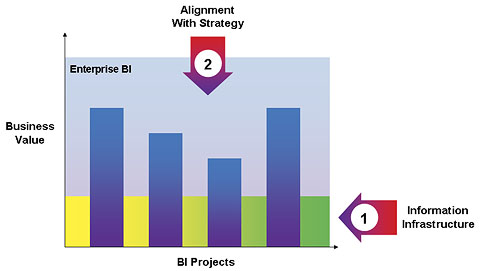Innovation Evangelism
-
Who Really Wants Predictive Analytics?
The value of predictive analytics is obvious: who wants to “drive looking out of the rear view mirror”? But in practice, predictive analytics hasn’t been widely implemented. What might change in the future? (more…)
-
Data Quality and The Art of Despair?
Courtesy of the despair.com site, Dr. E.L. Kersten uses a mailing list debacle to illustrate his Demotivators© organizational storytelling techniques. (more…)
-
The Top 6 On-Demand BI Confusions
I’m a big believer in the future of on-demand BI. But a lot of the articles promoting on-demand BI don’t always separate fact from self-interested fiction. Here’s my attempt to redress the balance. (more…)
-

Compare Yourself To a Hedge Fund Manager!
Top hedge fund managers made over $657M last year. Use this handy calculator to work out how long it took them to make more than you do all year — the time to brush their teeth? Take a shower? Commute?
-
Who’s in Charge of Information?
According to a recent InformationWeek article, CIOs aren’t very visible in today’s Fortune 100 companies, at least measured by their tendency to appear on the company’s management team web page. Even at companies like Google and eBay, where information is the lifeblood of the organization, the CIOs don’t appear among the other top execs (at Business…
-

Business Objects Buys FUZZY! Data Quality
Yet another acquisition: Business Objects purchases FUZZY! Informatik, based near Stuttgart, Germany, terms not disclosed The important: A “challenger” in Gartner’s 2007 data quality magic quadrant Adds European address databases to Business Objects’ existing portfolio and improves European customer base/sales expertise/coverage Vertical solutions for Postal, Financial services, and Telco SOA-enabled, which should make integration easy The…
-
Cognos Buys Applix
Only minutes after I post an entry on the acceleration of consolidation in the BI market, I see that Cognos has purchased Applix. The interesting part is TM1, which uses memory-centric BI technology that has been around for as long as I can remember, but which didn’t really come into its own until 64-bit platforms…
-
BI Market Consolidation?
The BI market has been remarkably fragmented for a long time, but — following the trend of other technology markets — it seems that the spiral of increasing dominance of a handful of vendors has finally been unleashed.
-

Two Key Steps From Project to Enterprise BI
A lot has been written about what typically goes wrong in individual BI projects, but even when individual BI projects are successful, many organizations stumble on the journey to true enterprise BI deployments. What goes wrong?
-

How Am I Doing, Really? The Need for Information On Demand
Your business is up over 25% — great news! Or is it? If the economy is also growing at 25%, you’re just keeping pace. And if your nearest competitor is up 50%, you’re losing market share… Despite the millions invested in corporate information systems, what executives really care about isn’t the internal numbers, but how…